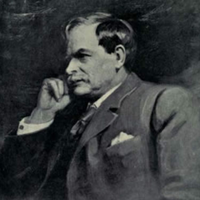Bereavement of the Fields
Soft fall the February snows, and soft
Falls on my heart the snow of wintry pain;
For never more, by wood or field or croft,
Will he we knew walk with his loved again;
No more, with eyes adream and soul aloft,
In those high moods where love and beauty reign,
Greet his familiar fields, his skies without a stain.
Soft fall the February snows, and deep,
Like downy pinions from the moulting breast
Of all the mothering sky, round his hushed sleep,
Flutter a million loves upon his rest,
Where once his well-loved flowers were fain to peep,
With adder-tongue and waxen petals prest,
In young spring evenings reddening down the west.
Soft fall the February snows, and hushed
Seems life’s loud action, all its strife removed,
Afar, remote, where grief itself seems crushed,
And even hope and sorrow are reproved;
For he whose cheek erstwhile with hope was flushed,
And by the gentle haunts of being moved,
Hath gone the way of all he dreamed and loved.
Soft fall the February snows, and lost,
This tender spirit gone with scarce a tear,
Ere, loosened from the dungeons of the frost,
Wakens with yearnings new the enfranchised year,
Late winter-wizened, gloomed, and tempest-tost;
And Hesper’s gentle, delicate veils appear,
When dream anew the days of hope and fear.
And Mother Nature, she whose heart is fain,
Yea, she who grieves not, neither faints nor fails,
Building the seasons, she will bring again
March with rudening madness of wild gales,
April and her wraiths of tender rain,
And all he loved,—this soul whom memory veils,
Beyond the burden of our strife and pain.
Not his to wake the strident note of song,
Nor pierce the deep recesses of the heart,
Those tragic wells, remote, of might and wrong;
But rather, with those gentler souls apart,
He dreamed like his own summer days along,
Filled with the beauty born of his own heart,
Sufficient in the sweetness of his song.
Outside this prison-house of all our tears,
Enfranchised from our sorrow and our wrong,
Beyond the failure of our days and years,
Beyond the burden of our saddest song,
He moves with those whose music filled his ears,
And claimed his gentle spirit from the throng,—
Wordsworth, Arnold, Keats, high masters of his song.
Like some rare Pan of those old Grecian days,
Here in our hours of deeper stress reborn,
Unfortunate thrown upon life’s evil ways,
His inward ear heard ever that satyr horn
From Nature’s lips reverberate night and morn,
And fled from men and all their troubled maze,
Standing apart, with sad, incurious gaze.
And now, untimely cut, like some sweet flower
Plucked in the early summer of its prime,
Before it reached the fulness of its dower,
He withers in the morning of our time;
Leaving behind him, like a summer shower,
A fragrance of earth’s beauty, and the chime
Of gentle and imperishable rhyme.
Songs in our ears of winds and flowers and buds
And gentle loves and tender memories
Of Nature’s sweetest aspects, her pure moods,
Wrought from the inward truth of intimate eyes
And delicate ears of him who harks and broods,
And, nightly pondering, daily grows more wise,
And dreams and sees in mighty solitudes.
Soft fall the February snows, and soft
He sleeps in peace upon the breast of her
He loved the truest; where, by wood and croft,
The wintry silence folds in fleecy blur
About his silence, while in glooms aloft
The mighty forest fathers, without stir,
Guard well the rest of him, their rare sweet worshipper.

